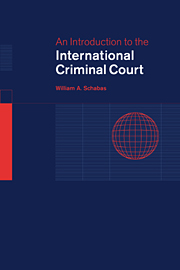Book contents
- Frontmatter
- Contents
- Preface
- List of abbreviations
- 1 Creation of the Court
- 2 Crimes prosecuted by the Court
- 3 Jurisdiction and admissibility
- 4 General principles of criminal law
- 5 Investigation and pre-trial procedure
- 6 Trial and appeal
- 7 Punishment and the rights of victims
- 8 Structure and administration of the Court
- Appendices
- Bibliography
- Index
6 - Trial and appeal
Published online by Cambridge University Press: 05 June 2012
- Frontmatter
- Contents
- Preface
- List of abbreviations
- 1 Creation of the Court
- 2 Crimes prosecuted by the Court
- 3 Jurisdiction and admissibility
- 4 General principles of criminal law
- 5 Investigation and pre-trial procedure
- 6 Trial and appeal
- 7 Punishment and the rights of victims
- 8 Structure and administration of the Court
- Appendices
- Bibliography
- Index
Summary
Although much of the procedure of the Court is a hybrid of different judicial systems, it seems clear that there is a definite tilt towards the common law approach of an adversarial trial hearing. However, the exact colouring that the Court may take will ultimately be determined by its judges. The terms of the Statute are large enough to provide for considerable divergence in judicial approaches. For example, Article 63(6)(d) entitles the Trial Chamber to ‘[o]rder the production of evidence in addition to that already collected prior to the trial or presented during the trial by the parties’. A traditional common law judge would view this as a power to be exercised only rarely, because an aggressively interventionist approach might distort the balance between the two adversaries at trial. A judge favouring the continental system could interpret the provision as a licence for major judicial involvement in the production of evidence, something that would seem most normal under his or her system.
Judges in the continental system expect most of the evidence to form part of the court record even prior to trial. The evidence already on the record will have been prepared beforehand by the investigating magistrate as part of the pre-trial proceedings. Common law judges, on the other hand, consider that they begin the trial as a blank sheet; indeed they believe that any prior knowledge of the facts is likely to prejudice their judgment. Under the common law system, prosecutor and defence submit the evidence that makes up the record in accordance with strict technical rules. Here too, the Statute leaves considerable ambiguity on this point.
- Type
- Chapter
- Information
- An Introduction to the International Criminal Court , pp. 118 - 136Publisher: Cambridge University PressPrint publication year: 2001

